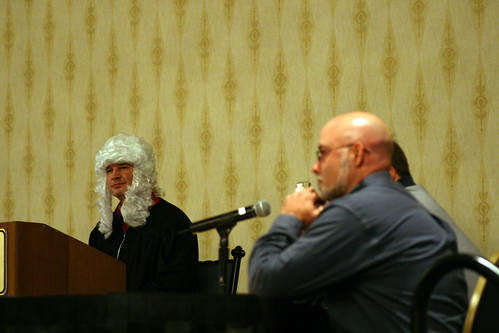What to Do Before the Hearing
As soon as practicable in the witness preparation stage, a witness should become familiar with the issue of the hearing and the subject matter of the testimony. This is a critical step in preparing to be an effective witness. Usually the witness is a principal or officer in the organization being asked to testify, so it is natural for that individual to be somewhat or very familiar with the hearing topic already. However, even in the best of circumstances in which the witness is the head of, or a top official for, an organization, he or she should be deliberative and diligent in preparing for a hearing.

To ensure adequate preparation as a knowledgeable or expert witness before a committee, a witness should spend time reading and reviewing pertinent organizational and outside information about the issues to be covered in the hearing. The witness should understand the committee and legislative process, and the type, purpose, and goal of the hearing. The witness should also have a firm grasp of the nature and context of the testimony he or she will present to the committee.
It is often a valuable exercise for a witness to conduct targeted reviews of materials and information from a variety of sources from both inside and outside the organization, including:
Previous Hearings — Consulting the hearing records or transcripts of previous hearings on the same or related issues, especially before the same committee, can provide excellent sources of information about the issue at hand, the perspectives of the committee and its members, likely questions to be asked, and previously considered strategies and remedies. In its training materials, the United States Government Accountability Office (GAO), whose members testify frequently before Congress, lists a number of key questions that can be answered through a review of previous congressional testimony and hearing records:
– What testimony has been given where presenters were in identical or somewhat similar situations?
– How did they deal with particular situations that might be causing you concern?
– What kinds of questions did committee members ask them?
– What kinds of responses did the witnesses make?
– How might those answers be improved?
– What were the major concerns of the chair, the ranking minority member, or other opinion leaders on the committee?
– What positions have members taken?
– What hints do those concerns and positions provide for your preparation, testimony, and answers?
[Source: Delivering Testimony, Participant Manual, United States Government Accountability Office (GAO), January 2007.]
Media Coverage and News Clips — Reviewing broadcast and print journalism coverage of
an issue that is the subject of a hearing can provide valuable information and perspectives in preparing for a hearing on that same subject. It can be especially helpful to review media reports and news clips form the home states and congressional districts of the members of a committee to discern press coverage and perspectives on a local level.
Congressional Inquiries, Correspondence and Questions — A review of congressional contacts with the witness’s organization can often provide a unique glimpse into the thinking, interests, and perspectives of Capitol Hill offices and committees. For government agencies, an analysis of congressional inquiries and correspondence may be helpful in preparation for a hearing. For organizations outside government, previous questions or inquiries made of the organization by Congress may provide helpful information during hearing preparation.
Issue Analysis — A thorough analysis of the issue that is the topic of the hearing is a highly recommended tool in the preparation of a witness for a hearing. This consideration especially applies if there have been recent public activities, incidents, or events that relate to the issue of the hearing and that have drawn public attention and scrutiny.
Stakeholder Analysis — A thorough analysis of the various interests — players and people — involved in a particular issue that is the subject of a hearing can be helpful to a witness in preparing for hearing testimony. This approach is especially helpful in determining the “drivers” for an issue, those who benefit from or are harmed by it, and the universe of those who care about the issue for any reason. Conducting a stakeholder analysis can also be help identify differing positions and perspectives on a given issue that can be helpful to a witness in formulating a more strategic approach to his or her role as a witness.
Opposition Research — Knowing the various and differing positions on a particular policy issue under consideration by a committee can be valuable and helpful information for a witness preparing to testify before a committee.
“Preparing A Witness For A Congressional Committee Hearing, Part I” from Testifying Before Congress, by William LaForge
Part II of this article will be published on November 8, 2010.
More
- Congressional Hearings database – from GPO
- Congressional Hearings – from the Law Library of Congress
- Capitol Hearings – from CSPAN
Courses
- Congressional Operations Briefing – Capitol Hill Workshop
- Congressional Dynamics and the Legislative Process
- Drafting Federal Legislation and Amendments
- Understanding Congressional Budgeting and Appropriations
- Advanced Legislative Procedure
Publications
CongressionalGlossary.com, from TheCapitol.Net
For more than 40 years, TheCapitol.Net and its predecessor, Congressional Quarterly Executive Conferences, have been teaching professionals from government, military, business, and NGOs about the dynamics and operations of the legislative and executive branches and how to work with them.
Our custom on-site and online training, publications, and audio courses include congressional operations, legislative and budget process, communication and advocacy, media and public relations, testifying before Congress, research skills, legislative drafting, critical thinking and writing, and more.
TheCapitol.Net is on the GSA Schedule, MAS, for custom on-site and online training. GSA Contract GS02F0192X
TheCapitol.Net is now owned by the Sunwater Institute.
Teaching how Washington and Congress work ™

